Tell us about your career journey. How did you become a speech and language therapist?
I initially wanted to be a clinical psychologist, so I started university studying for a psychology degree back in New Zealand. In my first year I stumbled across a communication disorders paper, which was when I started to look into speech therapy as a career instead. I decided to apply for a speech and language therapy degree and thought that if I got accepted to the course, I would do it. And I did!
After graduating, I worked in schools in education speech therapy for 4 years, before moving to work in adult speech therapy in hospitals for a further 4 years.
I then thought I’d try my luck and move from New Zealand to the UK, and here I am 3 years later where I’ve worked at Royal Brompton Hospital since making the move.
What does your typical day look like?
As speech and language therapy respiratory medicine lead, I’m part of the multidisciplinary team that looks after our respiratory patients. These are patients with underlying respiratory conditions such as asthma, interstitial lung disease, or have needs that require respiratory medicine expertise.
Most days, I provide support to both our inpatient and outpatient departments. We run outpatient video fluoroscopy clinics, which involve using x-rays to assess how a patient swallows in real time. We also run outpatient respiratory clinics, which involve seeing patients with chronic cough, voice changes, or other types of laryngeal dysfunction as a result of their respiratory condition.
On the wards, we see patients for a variety of assessments including the flexible endoscopic evaluation of swallowing (FEES) test – a test to see what’s happening inside a patient’s throat when they eat and drink, making sure food and drink aren't going down the wrong way and therefore contributing to recurrent infections that they've probably been admitted to hospital with. We also look at their case history to note key information related to their condition.

My role is extremely collaborative. I work closely with the medical team and other allied health professionals including respiratory physiotherapists, occupational therapists and dietitians. For example, we work as a multidisciplinary team when seeing neuromuscular patients – these are patients with progressive neurological conditions like motor neurone disease who may have mobility issues as well as speech and feeding issues. They come under our care when they require specialist respiratory procedures such as the insertion of breathing tubes (tracheostomy) or feeding tubes.
We also work closely with the sleep and ventilation specialist outreach team who care for long-term tracheostomy patients. They see up to 800 patients in the community who use various forms of ventilation, whether that be non-invasive ventilation masks or long-term tracheostomy. We hold joint sessions with our patients to look at how can we optimise their ability to communicate, eat and drink whilst they have their artificial airways.
What do you love about being a speech and language therapist?
I love that, particularly here at Royal Brompton, it's so well-recognised and collaborative. You have medical teams who would reach out for AHPs’ opinions, particularly speech therapy. You have a really strong voice in the patient journey. You get to know patients and be their advocate for communication.
What is the most challenging thing about your role?
I think the most challenging thing about the role is having so much variety and complexity, so the same thing that makes it incredible is also what makes it challenging.
For example, we might see a patient with a certain condition or this overlay of comorbidities. You read up on it and you manage that patient really well and you think, ‘Oh, great, I'll know what to do for next time’. But then you'll probably never see that combination of conditions again; next time it will be a patient with a similar condition, but they'll have a different overlay of complex comorbidities. I guess that's why we are a specialist tertiary centre!
What has been the highlight of your career so far?
I would say it’s the opportunities I’ve had so far. I’ve had the chance to work across the whole spectrum of speech therapy throughout my career – ‘cradle to grave’ as they like to call it, as you’re involved right the way through a person’s lifespan. Since coming to the UK, I’ve also had plenty of opportunities for innovation, getting the chance to attend conferences and work collaboratively with other professionals.
What advice would you give to someone training or considering a career as an AHP?
My key advice would be to reach out for shadowing opportunities to see what the role really entails. Being an allied health professional is such a rewarding career with so many opportunities across the world – this is coming from someone who has worked across 2 countries now. It’s varied and flexible and gives you such amazing life experiences.
